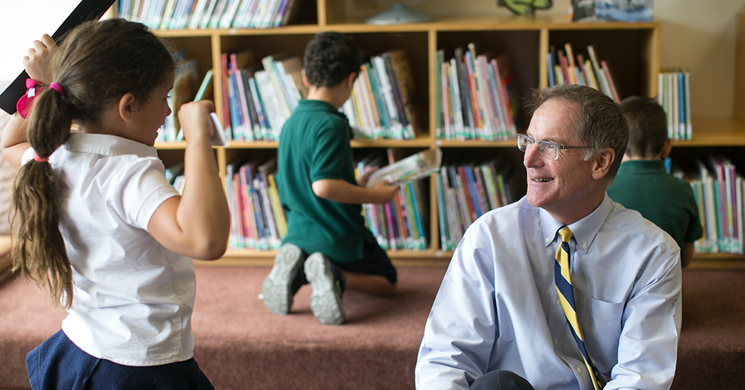Campbell Hall is a traditional college preparatory K-12 independent school that focuses on a holistic approach toward learning. Located in the Los Angeles area, the school honors the Episcopalian traditions of open inquiry and spiritual interconnectedness while also focusing on depth of content and open inquiry as a means to develop academic rigor. The overall goal at Campbell Hall is to develop purpose-driven, public-minded students who are prepared to meet and accept the challenges of the 21st century.
We recently spoke with headmaster Reverend Julian P. Bull about the school, its role within the community and how independent schools, in general, can help shape the world around us.
What is it about Campbell Hall that attracts families to your campus?
Reverend Bull: At Campbell Hall, we are primarily focused on the development of community, both within the walls of our school and as it pertains to our surrounding community. We see community as a multifaceted concept that includes relationships between the student body, their parents, teachers, school administrators and even the public schools located in the Los Angeles area.
We live in a complicated world where communities, corporations and nations are interconnected; success is dependent upon the ability to work in diverse teams and build toward a common goal. That’s why we work hard to create a warm, kind environment where teamwork can thrive. The interconnectedness that we foster is important for not just academic growth but from a social and emotional dynamic. The best work being done in the world is by teams of people who can work together to create extraordinary things. Our students need to learn the skills necessary to navigate these complications inherent in the 21st century so they can ultimately focus on the things that really matter.
What specific steps does Campbell Hall take to foster a holistic approach toward health, wellness and physical well-being among its student population?
Reverend Bull: At Campbell Hall, we strive to develop agile minds. There is a time and a place for rote memorization but we see that skill set as distinct from a student’s ability to do higher-level work. For this reason, we have recently replaced a number of the school’s Advanced Placement courses with our own newly developed Advanced Inquiry courses. The Advanced Inquiry framework gives our educators the ability to dive deep into a subject while also creating dialogue around an area’s most critical issues. This model presents course material in a direct and personal way, which engages student interest and keeps the spirit of inquiry alive. This approach ultimately develops strong minds but it’s also the mindset that college admissions officers seek when building an incoming freshman class.
Still, our school’s approach isn’t purely academic. Our general orientation toward wellness and the reduction of unnecessary stress has led us to create a daily schedule that’s aligned with our student’s biological rhythms. Brains work better when they’re well-rested. That’s why our middle- and high-school students start their day relatively late — at 8:50 four days a week and at 9:30 each Wednesday. This schedule is better aligned with the natural sleep patterns of teenagers so they arrive in the classroom well-rested and ready to learn.
We also arrange our classes in 75-minute blocks, instead of in the traditionally accepted 50-minute class periods. This longer schedule means teachers can delve into a topic and facilitate a spirited classroom discussion. Longer blocks also equate to fewer classes per day, which cuts down on the number of homework assignments meted out each day.
How does Campbell Hall interact with and impact its surrounding community?
Reverend Bull: Our team works diligently to create a curriculum that helps develop students academically but also prepares them to become good citizens. In the past 10 years, Campbell Hall has initiated several community-based programs that forge partnerships with area public schools. These programs help the surrounding community, but they also help develop public-spiritedness among Campbell Hall students.
Our largest partnership is the Campbell Hall Scholar’s Program, which is an academically rigorous summer program we run for talented college aspirants in area Title I schools. Campbell Hall teachers, students and graduates act as tutors and mentors to students in sixth grade and up. We follow those same students, year-after-year, and build upon the scope of the project as students age. Students receive after-school tutoring, and they attend social events like camping trips and college campus tours, to get a sneak peek at campus life. We even have several internship opportunities available through the Campbell Hall network of parents. The program is in its fifth year now (2018/2019 school year), so our oldest students are now in the 11th grade. We plan to continue support into college as well.
We also host several other public-purpose programs. Campbell Hall high schoolers teach a summer film camp with 20 students from Campbell Hall elementary and 20 from public elementary schools via L.A.’s BEST. Our high schoolers also teach elementary-school-based creative writing camp in schools that have lost their creative arts programs.
These programs allow us to provide support to these area schools but the gain is two-way. Our students love to be of use; they love to feel needed and productive. Also, when our students teach something, they learn it better. What’s more, by viewing the complexities of the community firsthand, our students become more aware citizens. These programs show our students how a cooperative partnership can be built, how resources can be shared and how their work can make a difference.
What role does diversity play in Campbell Hall’s educational approach?
Reverend Bull: We believe that diversity is crucial on all levels: among the student body and faculty and with regard to how ideas are presented within the classroom. A diverse population can create a platform for the exchange of differing viewpoints as well as a thorough treatment of a particular subject.
To succeed in today’s world, students need to learn to work in diverse teams. That’s the only way we as a society will one day come together to find solutions to overarching problems like racial strife or global climate change. A quarter of our students receive reduced tuition while 38% of students and 27% of faculty are people of color.
At the same time, it behooves us as a school to educate our students in a way that reflects the diversity of the city in which we reside. Our public-purpose programs affect 120 students within our surrounding community. That number may represent a small slice of the Los Angeles-area population but, if all the independent schools in the area were able to affect that many students, the overall community reach could be immense. That responsibility is what we aim to engender among our student population. We want to develop strong minds but, more important, we want to create capable citizens who can effect positive change in the world.
To learn more about First Republic and our work with nonprofit organizations, visit our nonprofit page.




